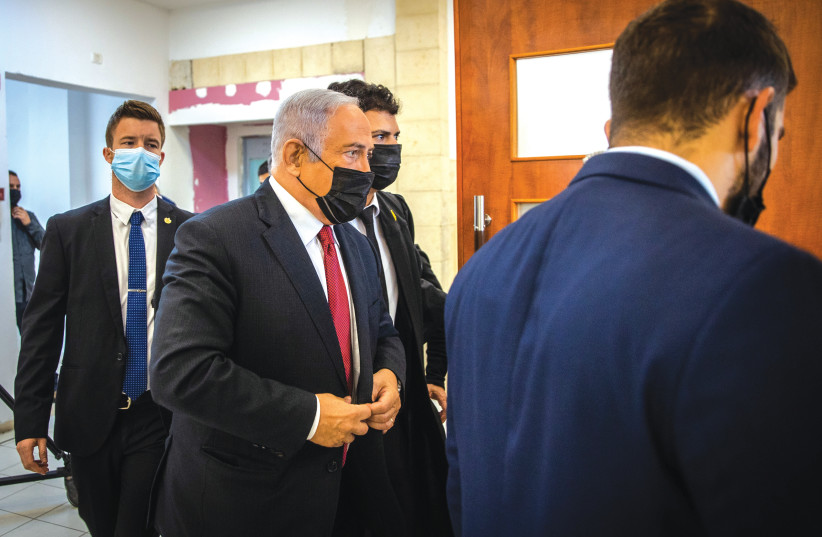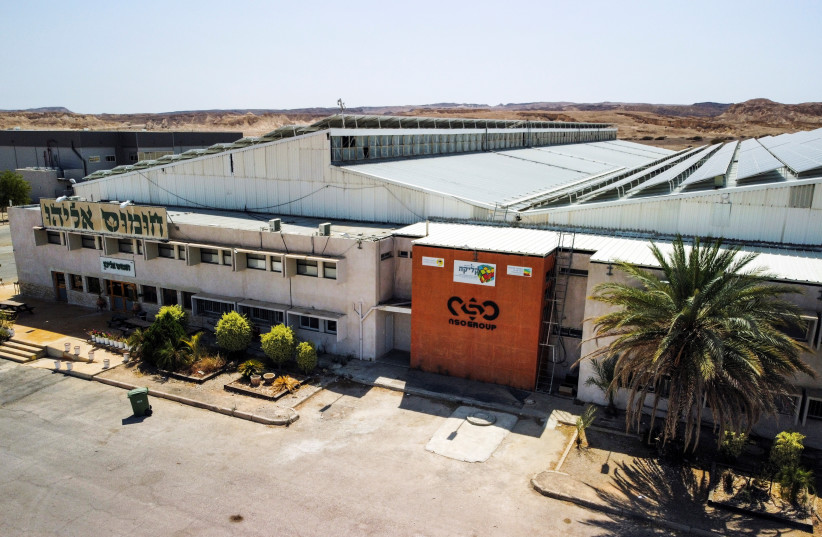by Herb Keinon
As Netanyahu was being accused of undermining the rule of law, those charged with preserving that law were breaking it.
 |
OPPOSITION LEADER MK Benjamin Netanyahu arrives for a hearing in his ongoing trial at Jerusalem District Court in November.
(photo credit: OREN BEN HAKOON/FLASH90)
|
Only “heaven’s grace” saved Israel’s democracy from former prime minister Benjamin Netanyahu, then attorney-general Avichai Mandelblit was quoted in November as saying in a private conversation.
Mandelblit’s comment, brought to the public’s attention on Channel 12, echoed a sentiment that had by then gained enormous traction: Netanyahu was a threat to democracy.
Anti-Netanyahu protesters marched under this banner week after week outside the Prime Minister’s Residence on Balfour Street in Jerusalem; bitter personal enemies such as former premiers Ehud Barak and Ehud Olmert repeated the mantra matter-of-factly from any available microphone; and political rivals such as Yair Lapid, Benny Gantz, Gideon Sa’ar and Ze’ev Elkin used that claim to make political capital.
Netanyahu was a danger to democracy; Netanyahu was turning Israel into President Recep Tayyip Erdogan’s Turkey.
And all the while, the police – allegedly without a court order – used NSO Group’s powerful Pegasus spyware to suck out all the phone contents of certain individuals, including at least one central state’s witness in one of the cases against Netanyahu.

In other words, as Netanyahu was being accused of undermining the rule of law, those charged with preserving that law were breaking it. Law enforcement officers were illegally taking control of various people’s phones. The police were invading people’s privacy without a court order.
Talk about a threat to democracy.
Let’s say, for argument’s sake, that Netanyahu is guilty of the very worst charge against him – bribery via giving regulatory favors worth hundreds of millions of shekels to a communications tycoon in exchange for positive press coverage for him and his family. What is the bigger threat to democracy? What places Israel more squarely on the road to dictatorship: that or the police illicitly gaining access to people’s phone conversations, emails, pictures and contacts – in short, their whole lives?
The truth is that neither was truly a threat to democracy: neither Netanyahu nor the police, because Israeli democracy is strong enough and resilient enough – and has enough necessary checks and balances – to fend off genuine threats. Much of the “threat to democracy” talk is hyperbole. Not everything undemocratic – even if very unseemly – is a mortal threat to democracy itself.
Nevertheless, given the recent Pegasus revelations, one would expect that those for whom preserving Israeli democracy was always their utmost concern when it came to prosecuting Netanyahu would now be at the forefront of the outcry against the police and law enforcement agencies’ abuse of power.
One would expect that those who marched under the banner of “Crime Minister” would now be directing their wrath at the police, or the law enforcement officers, who sanctioned the use of illicit means of surveillance.
From the very beginning of the investigation into the Netanyahu cases, law enforcement officials engaged in some highly questionable tactics, starting with a flood of leaks from the investigations that seemed designed to keep these cases very much in the public eye and create public pressure for an indictment, to the manner in which Netanyahu’s confidants, such as Nir Hefetz, were coerced into turning state’s witness. Hefetz documented those tactics – including emotional and even physical abuse – in court.
But these sharp and uncomfortable corners were rounded because the ends – getting to Netanyahu, that Erdogan-like threat to Israeli democracy – justified the means, even if those means were themselves antidemocratic.
That doesn’t mean Netanyahu is blameless. The verdict is still out, literally, on whether he abused his power by taking gifts amounting to hundreds of thousands of dollars and whether he did indeed grant regulatory favors in exchange for positive coverage.
Not in question, however, is that once the indictments against him were filed, he did what he could to undermine the public’s confidence in the police, the state attorney, the attorney-general and ultimately the court itself.
Ironically, the Pegasus revelations have now given the public due cause to lack faith in these institutions that Netanyahu tried to instill. These institutions now need to engage in genuine stock-taking. A government commission of inquiry would be a good place to start.
Law enforcement officials, according to Sunday’s headlines, are now expected to argue that information they illicitly obtained through the use of the spyware did not help them build their cases against Netanyahu or was not actually necessary in building those cases.
But is anybody expected to believe that, especially since the same law enforcement agencies said just a couple of weeks ago they did not use Pegasus without the proper authorization when it now emerges that they did just that in one of the most sensitive cases in the country’s history?
Mandelblit, in that private conversation four months ago, spoke of “heaven’s grace” sparing Israeli democracy from Netanyahu. He might have been right in invoking heaven’s name, but what he should have done from the outset of this saga is instill in the law enforcement officials the fear of heaven when investigating a sitting prime minister.
Go ahead and investigate, but make absolutely sure that there is fail-safe supervision and that everything is done with utmost transparency and is completely aboveboard. Being that these investigations could bring down a democratically elected leader, approach that with fear and trembling.
In the present case, the prime minister was brought down, but the needed vigilance and care were not employed. The end result is now the mess the country finds itself in.
A not insignificant part of this country feels that the legal system unfairly targeted Netanyahu, and now the recently revealed police surveillance tactics have given them a firm leg to stand on.
Those who say that it doesn’t matter how the evidence against Netanyahu was gathered, since his actions were “a threat to democracy,” will now have to explain how the illicit actions of the law enforcement agencies are not – if left unchecked – even a greater threat.
Herb Keinon
Source: https://www.jpost.com/israel-news/article-695689
No comments:
Post a Comment